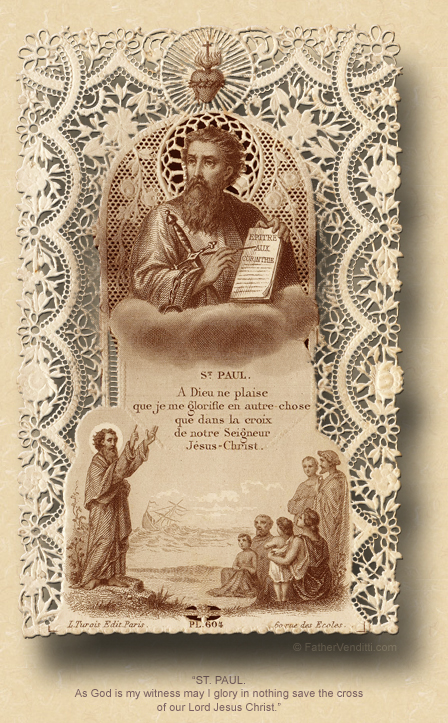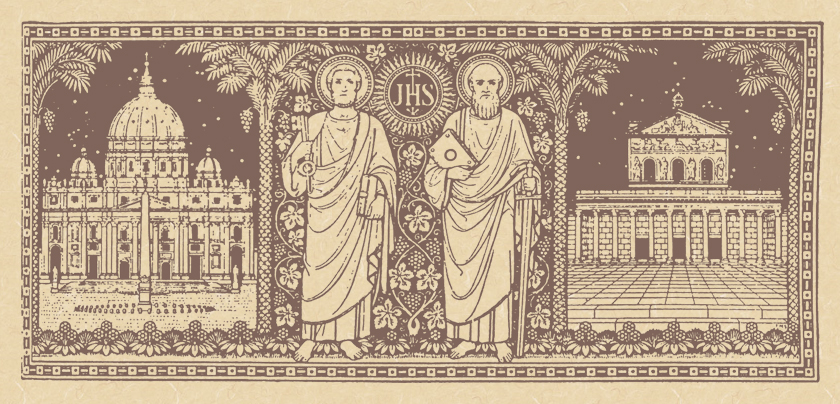Using the Wisdom of the World.
The Seventh Thursday of Easter; or, the Memorial of Saint Norbert, Bishop.*
Lessons from the feria, according to the ordinary form of the Roman Rite:
• Acts 22: 30; 23: 6-11.
• Psalm 16: 1-2, 5, 7-11.
• John 17: 20-26.
|
When a Mass for the memorial is taken, lessons from the feria as above, or from the proper:
• Ezekiel 34: 11-16.
• Psalm 23.
• Luke 14: 25-33.
… or, any lessons from the common of Pastors for a Bishop, of the common of Holy Men & Women for Religious.
|
The Third Class Feast of Saint Norbert, Bishop & Confessor.*
Lessons from the common "Státuit …" of a Confessor Bishop, according to the extraordinary form of the Roman Rite:
• Ecclesiasticus 44: 16-27; 45: 3-20.
• [The Gradual is omitted.]
• Matthew 25: 14-23.
FatherVenditti.com
|
6:36 AM 6/6/2019 — Today’s first lesson from Acts requires a little background. The commander of the Roman Legion acts to protect the Blessed Apostle Paul here because Paul, unlike any of the other apostles of our Lord, is a citizen of Rome, and had been since before his conversion. We’re not sure how Paul came to be a citizen of the empire, but he is; and, while it is to his benefit here, it ultimately results in him being taken to Rome to be tried for treason, which is alluded to at the end of the lesson.
But right now it works in his favor. The commander, trying desperately to placate everyone, convenes the Sanhedrin to discuss their problem with Paul; and, here is where Paul really shows his genius, because there are two different classes of rabbis in this Sanhedrin: the Pharisees and the Sadducees, and they had different beliefs. The Pharisees were a relatively recent phenomenon, who don’t appear until some sixty years or so before the birth of our Lord in the Second Book of Maccabees.  The Sadducees represent the “old guard” as it were, the ultra-traditionalist wing of the rabbinical class. By that I don't mean that they were overly strict—if anything, the Pharisees were much more rigorous in their interpretation of the Law and the Prophets—but that they represented Jewish theology frozen at a time about three hundred years or so before the birth of our Savior. The Sadducees represent the “old guard” as it were, the ultra-traditionalist wing of the rabbinical class. By that I don't mean that they were overly strict—if anything, the Pharisees were much more rigorous in their interpretation of the Law and the Prophets—but that they represented Jewish theology frozen at a time about three hundred years or so before the birth of our Savior.
There were a lot of things that distinguished the theology of the Sadducees from the more contemporary Pharisees, but the most striking would probably be the almost total lack of thought regarding anything resembling an afterlife. We find that shocking because we can't conceive of practicing any kind of religion without some sort of promise of happiness to come; but, if you look at the Old Testament, God's covenant with His people is always a quid pro quo in the here and now: if Abraham worships Him, God will make him the father of many nations; if they follow Moses out of bondage and accept from him the law, God will give them a land flowing with milk and honey. The reward for being faithful to God is always something that's going to happen to them while they're still here. The first time anything resembling an afterlife appears is at the tail end of the Old Testament in the two books of Maccabees, when Judas Maccabeus takes up the collection for the dead, and this is right around the time that a new party of rabbis is coming into its own, called the Pharisees, and this is just sixty years or so before advent of our Blessed Lord.
Paul uses this to his advantage, as we just heard. When he is before the Sanhedrin, he raises this issue of the resurrection from the dead to drive a wedge between the members of the council, requiring the commander to intervene and rescue him, but which will ultimately result in him being sent to Rome for trial. But, that’s okay with him, since he knows his destiny is to give his life for Christ.
The simple reflection for us today is that Paul was not adverse to using the wisdom of the world the escape the problem of the moment. Even so, he did what he had to do for our Lord without any thought for himself. Let us ask him to infuse us with that same courage and determination, so that, whenever we are faced with a moral choice, we will always do the right thing, trusting that the Lord will give us the grace to see it through to the end.

* Born in Xanten in what is now Germany, Norbert (1080-1134) turned from a worldly life to become a monk and itinerant preacher, founding the Premonstratensians, a semi-monastic community dedicated to a combination of contemplative life and public preaching; they are more commonly referred to today as the "Norbertines," though that is not their official name. He was later consecrated Archbishop of Magdeburg, and was an important ally of Pope St. Gregory VII in the latter's attempt to impliment a reform of the Church; he also was instrumental in helping Pope Innocent II triumph over the anti-pope Anacletus.
|

